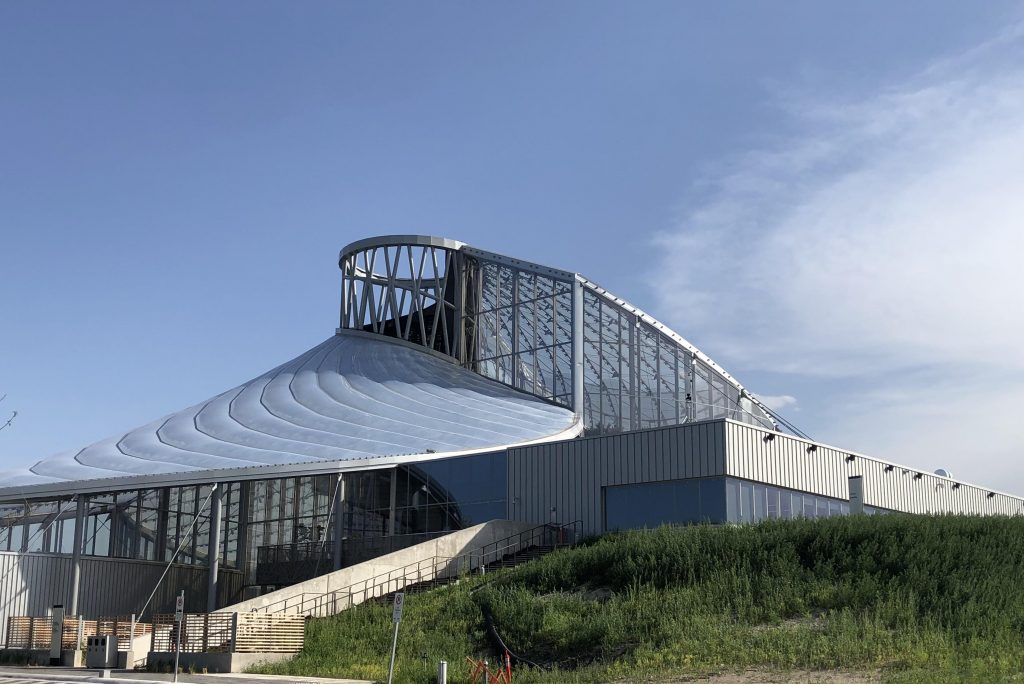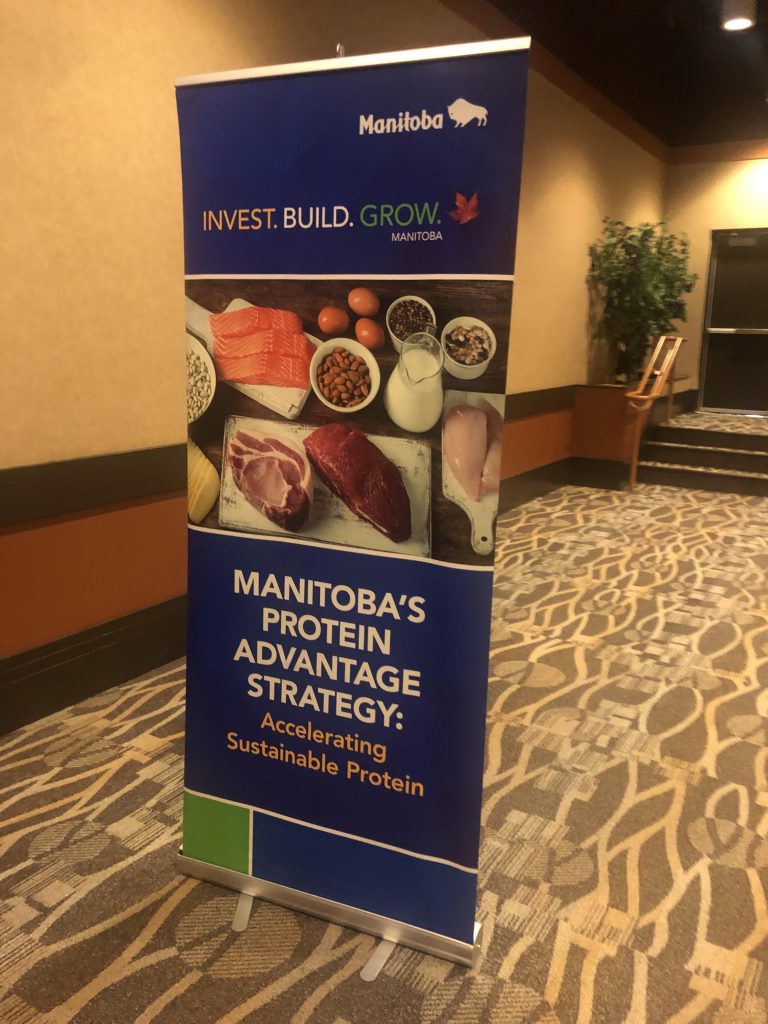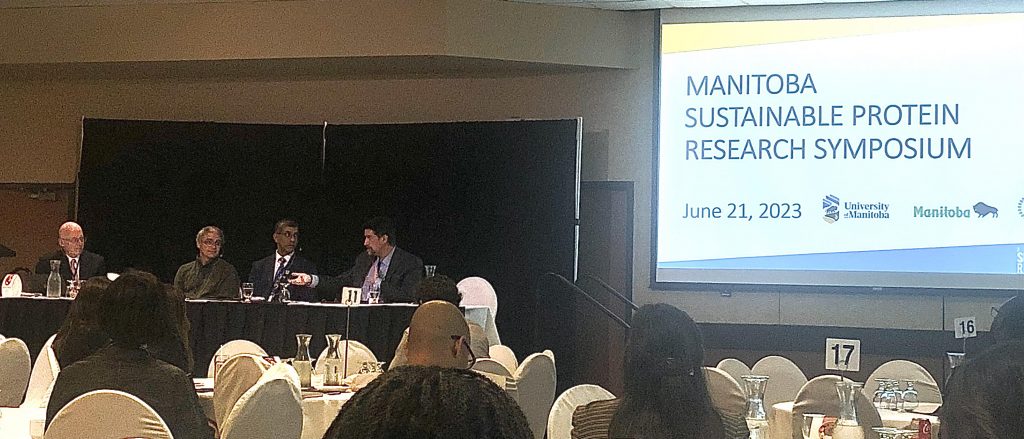By: Nicole Breedon
June 29, 2023
June 20th and 21st marked the 3rd Annual Manitoba Sustainable Protein Research Symposium. This two-day event was hosted by the University of Manitoba, Manitoba Agriculture, and the Manitoba Strategic Research Chair in Sustainable Protein. The Rural Development Institute (RDI) was happy to be a Silver Sponsor for the event, as we are currently supporting a food sustainability project created and ran by Bruce Hardy, CEO of Myera Group. Attending this event alongside Shirlyn Kunaratnam provided a fantastic opportunity to learn more about sustainable food systems and a multitude of projects conducted by researchers across the country.
The symposium aimed to share the work being done within the field of sustainable food production, facilitate networking connections, and support the continued research efforts towards sustainable protein. Experts, industry professionals and students from institutions across Canada came together to discuss their research, expand on the applications of their studies, and showcase the importance of their work. To learn more about some of the symposium speakers, please visit the Manitoba Protein webpage.

The evening of the 20th included a dinner hosted at The Leaf, located in the Assiniboine Park. Throughout the evening, a variety of foods created with sustainable proteins such as beans, peas and fish were provided – much in line with the theme of the event! The evening was amazingly attended, and casual networking activities allowed for conversations to be had with a variety of people registered for the symposium. To finish the evening off, Joelle Foster moderated a panel discussion with Mavis McRae, Kelly Beaulieu and Kim Kline. The discussion focused on Women in Business and STEM and included perspectives on personal struggles these women have experienced, as well as advice they had for those entering the workforce. The responses to these panel questions largely related to the importance of confidence, supporting those who are marginalized, and sharing personal perspectives in order to increase awareness of the inequitable systems many of us have to navigate. While the lively discussion provided immense insights, one panel member noted that it did feel odd having these discussions after decades of social movements – raising the importance of addressing these inequities.
The first presentation of day two was conducted by University of Manitoba Associate Professor, Dr. Luc Clair. His discussion focused on his work and research associated with the Canadian Centre for Agri-Food Research in Health and Medicine (CCARM), showcasing the Health Economics of Sustainable Protein. This presentation provided increasingly interesting insights regarding the impact food and nutrition has on personal health, as well as the Canadian healthcare system overall. The consumption of plant-based proteins not only lowers the risks of cardiovascular health conditions, but these steps to maintain personal well-being through diet also allows for reduces pressures on the healthcare system. The projections of healthcare costs – and more specifically, the impacts proper diet has on said costs – were shocking to say the least, reinforcing the importance of nutrition in relation to national economics on a larger scale. With regard to the Myera Group project, this presentation demonstrated how vital consistent access to highly nutritious food is for those living in Canada.

The day continued with a variety of researchers exploring topics relating to protein sustainability. Alongside insights into nutrition and food systems, Jacqueline Keena presented on Sustainable Protein, Big Data, and Artificial Intelligence (AI). As the Managing Director of the Enterprise Machine Intelligence and Learning Initiative (EMILI), her talk provided examples of how learning technologies are supporting agricultural food production. It was astonishing to see the work being done on the Innovation Farms within Manitoba, and the new tools being developed to help agriculturalists grow foods sustainably. With technology constantly advancing on a day-to-day basis, I’m excited to see what other agricultural aids will become more commonplace on Canadian farms in the years to come
The second panel discussion of the day included insights from Dr. Jim House, Dr. Lingyun Chen and Dr. Mike Nickerson with regard to Training the Next Generation of Protein Foods Researchers. This discussion reviewed the NSERC-CREATE Canadian Agri-Food Protein Training, Utilization, and Research Enhancement (CAPTURE) program, which focuses on providing scientific coursework alongside industry experience at the Masters and Doctoral levels. This pan-prairie program is focused on ensuring that upon graduation students will have joint experience in both research and the workforce. It also allows for students to build solid networks that are in line with their research interests. As a recent graduate student, it was interesting to see how the supports provided by the program were put in place to ensure post-graduation success through relevant experience-based practicum placements. The panelists noted that students involved in the CAPTURE program were encouraged to participate in the symposium. Whether sharing their work through podium presentations or posters during the scheduled viewing times, it was great to learn more about their unique experiences and insights into sustainable protein.

The presentations on day two were concluded by a third and final panel discussion by Bruce Hardy, Dr. Tim Sharbel and Dr. Sagadevan Mundree. The panelists explored the complexity of Co-Culturing Wild Rice and Fish: An Indigenous Approach to the Circular Economy – described above as the Myera Group project. While many themes related to the project were reviewed, the importance of a circular economy were emphasized. Not only would this systems approach allow for more environmentally sustainable food production within rural and remote Indigenous communities, but it has the potential to facilitate sovereign wealth creation for the people involved. The idea of this mass-scale food production was explained by Bruce Hardy, where one day it is the hope that economic distribution of the rice created within these circular farms would additionally facilitate consistent income alongside food sovereignty for the communities. Panelists reflected on the importance of food sovereignty on a global scale as well as the understanding that food is medicine, and nutrition can influence chronic illnesses in these marginalized communities. The importance of Reconciliation in research and Indigenous inclusion were not understated, but at the forefront of this panel discussion, and these researchers aim to continue their efforts on this community-based project to support positive developments in the lives of those around Canada and beyond. As a researcher for RDI, it was great to see this in depth discussion regarding the project on a global scale, and if you’re interested in learning more about how the Rural Development Institute has been supporting the Myera Group project, please visit the RDI Project Overview.
Attending the Protein Research Symposium provided me with many new insights into the world of sustainable protein (not to mention that the end-of-event goody-bag was packed with delicious and nutritious treats!). These new understandings of food systems are crucial as RDI continues to support projects related to community development and food production. It was great to see all of the incredible work being done contemporarily, and we hope to share more on these topics soon.
